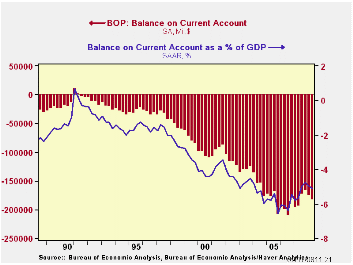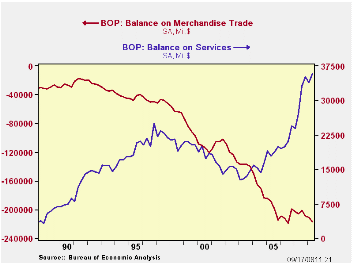 Global| Sep 17 2008
Global| Sep 17 2008U.S. Current Account Deficit Slightly Deeper in 2Q'08
by:Tom Moeller
|in:Economy in Brief
Summary
The US current account deficit deepened slightly last quarter to $183.1 billion from a revised $175.8 billion during 1Q. The 2Q deficit was slightly deeper than the Consensus expectation for a reading of $179.9 billion. As a [...]

The US current account deficit deepened slightly last quarter to $183.1 billion from a revised $175.8 billion during 1Q. The 2Q deficit was slightly deeper than the Consensus expectation for a reading of $179.9 billion.
As a percentage of GDP the deficit fell to 5.1%. That level has been fairly constant during the last year. It is reduced, however, from its peak percentage late in 2005, of 6.5% of GDP.
During 2Q, the deficit on goods trade deepened again just slightly to $216.3 billion. Higher oil prices raised imports by 4.7% though exports continued firm and they rose by a stronger 6.1%. The deficit grew because imports are the greater total versus exports. The deficit on goods trade has been fairly steady near $200 billion since late-2005.
The lower U.S. dollar and the strength of foreign economies versus the U.S. continued to be apparent in the surplus in services trade. It grew to a record $35.8B but prior figures were revised to show a smaller surplus. Exports of travel services grew 22.0% y/y and passenger fares were up 31.8%, the strongest y/y gain since late-1990. Imports grew 8.9% and travel imports grew 9.1%. Passenger fares grew 16.5% y/y.
The trade surplus on earned income narrowed to $27.3B but the 1Q surplus was revised up sharply. The deficit on unilateral transfers narrowed just slightly to 29.9B.
Oil and U.S. Macroeconomy: An Update and a Simple Forecasting Exercise from the Federal Reserve Bank of St. Louis can be found here.
The Credit Crunch of 2007-2008: A Discussion of the Background, Market Reactions, and Policy Responses also from the Federal Reserve Bank of St. Louis is available here.
| US Balance of Payments, Bil.$, SA | 2Q '08 | 1Q '08 | Year Ago | 2007 | 2006 | 2005 |
|---|---|---|---|---|---|---|
| Current Account Balance ($ Bil.) | -183.1 | -175.6 | -194.1 | -731.2 | -788.1 | -729.0 |
| Deficit % of GDP | -5.1 | -5.0 | -5.8 | -5.3 | -6.0 | -5.9 |
| Balance on Goods ($ Bil.) | -216.3 | -211.0 | -205.9 | -819.4 | -838.3 | -787.1 |
| Exports | 6.1% | 4.8% | 20.7% | 12.3% | 14.4% | 10.8% |
| Imports | 4.7% | 3.3% | 14.1% | 5.7% | 10.7% | 13.9% |
| Balance on Private Services ($ Bil.) | 35.8 | 33.9 | 27.1 | 119.1 | 85.0 | 75.6 |
| Exports | 2.7% | 1.2% | 14.1% | 14.6% | 11.5% | 10.2% |
| Imports | 1.8% | 2.8% | 8.9% | 8.4% | 11.3% | 7.7% |
| Balance on Income ($ Bil.) | 27.3 | 33.2 | 9.7 | 81.8 | 57.2 | 67.2 |
| Unilateral Transfers ($ Bil.) | -29.9 | -31.7 | -25.0 | -112.7 | -92.0 | -89.8 |
Tom Moeller
AuthorMore in Author Profile »Prior to joining Haver Analytics in 2000, Mr. Moeller worked as the Economist at Chancellor Capital Management from 1985 to 1999. There, he developed comprehensive economic forecasts and interpreted economic data for equity and fixed income portfolio managers. Also at Chancellor, Mr. Moeller worked as an equity analyst and was responsible for researching and rating companies in the economically sensitive automobile and housing industries for investment in Chancellor’s equity portfolio. Prior to joining Chancellor, Mr. Moeller was an Economist at Citibank from 1979 to 1984. He also analyzed pricing behavior in the metals industry for the Council on Wage and Price Stability in Washington, D.C. In 1999, Mr. Moeller received the award for most accurate forecast from the Forecasters' Club of New York. From 1990 to 1992 he was President of the New York Association for Business Economists. Mr. Moeller earned an M.B.A. in Finance from Fordham University, where he graduated in 1987. He holds a Bachelor of Arts in Economics from George Washington University.
More Economy in Brief
 Global| Feb 05 2026
Global| Feb 05 2026Charts of the Week: Balanced Policy, Resilient Data and AI Narratives
by:Andrew Cates






